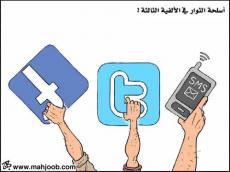One may argue that technological progress has overcome the “impossible” just to reach the outcome of an increasingly individualistic society where “me, myself and I” are the priority and the rest can wait (or carry on with their busy self involved selves). We can go even further into stating that since the IT era, relationships and interactions between people have been deteriorating at an alarming pace and we seem to have fallen in a comfort zone where we expect everything to be served to us on silver…tablets.
I tend to disagree on a few levels. I will not deny the paradox of a communication era where communication seems to be the main deficit of our society and that through the millions of available communities (on or off line) it is genuinely difficult to forge meaningful relationships. And yet, let’s have a look at the full half of the digital glass, with emphasis on the opportunities the new media offers us, the simple every day citizens to mobilize in massive turnouts and ask for our rights, changes in the governance or protests against unwelcomed political decisions (or for others’ rights, who may not have the possibility to speak up and ask for them themselves). Honestly speaking, this sort of mass mobilization usually takes place when protesting against certain issues (such as disrespect for human rights in underdeveloped or developing countries, disregarded animal rights, ecological disasters etc) rather than other reasons. Nevertheless, the new social networks empowered the little people with the ability to easily and quickly create integrative communities based on shared interests (may those be goals that require implication over months or even years or simply responding to today’s morning event) and the possibility of a quick, prompt response to world’s events. Sure, the world has seen uprisings, parades and protests long before the age of Youtube, Twitter and Facebook, there’s no doubt about that, so what’s all the fuss about? True, it has been done before…but not quite the same. Space, time and the number of participants seem to dissolve and lose all relevance. Therefore, deterritorialized communities consisting of members who may have never seen one another before, living hundreds and thousands of miles away from another and going to sleep when the other wakes up need now not to worry about these previously challenging logistical obstacles. They may just as well create the public sphere, the forum where ideologies and desire for involvement in local, national, global politics and governance flourish, taking form in an almost mythical manner comparable to the ancient Greek democratic ideal.
The rise of the global civic society – threat or ally in worldwide political and diplomatic affairs? Facilitating factor in the decision making process or annoyingly loud popular opinion? From my completely biased point of view, as one ordinary citizen with disappointingly little power in the national political arena ( the once in a blue moon elections of leaders I know virtually next to nothing about does not get me even close to the “rule by, for and with the people” grounding principle of democracy) I believe in the potential for popular participation the new media so willingly serves us. For the sake of the argument, I will take one example that I find most relevant for my above stated frustration: in January 2012 the Romanian public reacted through massive turnouts during 3 tumultuous weeks as a response to a suggestion of health reform which compromised the well-functioning of the emergency service and the public nature of health care. The social networks exploded with angry posts and opinionated users decided to take matters in their own hands and give the politicians a piece of their minds by organizing protests against the detrimental law project. The movement soon evolved in an anti-governmental manifestation since the economic situation of the country became unbearable to many and the government was blamed for inefficient, even destructive policies and reactions to the crisis. Can you force participatory democracy? Apparently you can, since the manifestations resulted in the creation of a new cabinet and the withdrawal of the legislation. The people have spoken…even though no one really bothered to ask.
Therefore, I perceive social media as a tool which changes the power balance within a state. The dynamic of policy making is no longer from upwards, the high political class downwards to the citizens. It has been proven in countless examples. Of course, it’s needless to feed ourselves with dreams and fantasies of a fully empowered society no longer at the mercy of our governments and fool ourselves into believing our work here is done but still, we have discovered an instrument to voice our preferences jointly, unite in a shared attitude towards the same issue and could I daresay, partially control the way in which governance is performed?
The tricky part is, how do we use it wisely?

Firesc ar fi ca mass-media, ca o portavoce a societatii, sa influenteze clasa politica in procesul decizional. Cu riscul de a fi catalogat drept un adept al teoriei conspiratiilor, afirm ca, in cele mai multe cazuri, puterea este cea care manipuleaza masele prin intermediul trusturilor de presa. Se spune ca nici o miscare sociala nu invinge daca CNN nu este prezent cu transmisii in direct …
In conditiile in care puterea isi exercita corect obligatia de consultare publica probabil ca rolul forumurilor de pe retelele de socilizare ar fi puternic deteriorat. In acelasi timprolulmass mediei publice ar capata o importanta deosebita. Dar oare de cate ori se intamplaasta in realitate? Oare nu cumva mediulon-line a capatat putere datorita gradului mare de independenta fata de putere? asta pana la momentul in care puterea devine constienta de rolul mediului on-line si profita la randul ei pentru a dezinforma sau la a presara incertitudini in acelasi mod.